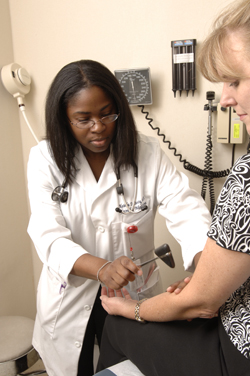FSU medical school among best in nation for producing family doctors
The Florida State University College of Medicine is ranked second in the nation for the percentage of its graduating doctors who choose to specialize in family medicine, according to the American Academy of Family Physicians.

Over a three-year period, 19 percent of FSU College of Medicine graduates have entered family medicine residencies, trailing only the University of Kansas School of Medicine (22 percent). No other medical school in Florida rated in the top 50. The AAFP tracks the success of U.S. allopathic and osteopathic medical schools in producing doctors who select family medicine residencies, and the journal Family Medicine publishes the results annually.
"We're pleased that our progress in meeting one of Florida's most significant health care challenges is being recognized," said College of Medicine Dean J. Ocie Harris. "This is an indication that we have been successful identifying students who share our mission and who understand the important role family practitioners play in our health care system."
In addition to its three-year success, FSU tied Marshall University among U.S. medical schools with the largest percentage of graduates (22.2 percent) entering family medicine residency programs over the past year.
This is the first time the FSU College of Medicine, which graduated its first class in 2005, has been eligible for inclusion. Part of the college's mission is to answer the call for more primary care physicians in Florida, where there is an increasing shortage, especially in rural areas. Florida will need an additional 12,000 primary care physicians by 2020 due to population growth and ongoing changes in the state's physician workforce, according to an AAFP study.
"As the state of Florida faces the daunting challenge of having to recruit nearly 12,000 primary care physicians by 2020 to meet its growing primary health care access needs, it is refreshing that one of the state's public medical schools is embracing that challenge," said Tad Fisher, executive vice-president of the Florida Academy of Family Physicians (FAFP).
Outreach efforts at FSU started with the Program in Medical Sciences (PIMS), begun by the Legislature in 1971 at FSU to help fill a void of physicians practicing in rural Northwest Florida.
"We recognized from the start the need for outreach and a pipeline of students who are responsive to community needs, especially through service to elder, rural, minority and underserved populations," said Dr. Daniel Van Durme, professor and chair of the department of family medicine and rural health at the FSU College of Medicine. "Our curriculum has many opportunities for students to be taught by family physicians in the medical school and community settings, thus establishing role models and mentors."
The role models and mentors include three College of Medicine faculty members who have been named Florida Family Physician of the Year by the FAFP over the past four years.
Numerous studies have demonstrated that primary care from a family physician results in higher quality and lower cost health care than with specialty care. Family physicians diagnose and treat more than 90 percent of all patient problems, including biological and mental health concerns. Studies also show a greater effectiveness by specialists when patients are referred by a family physician.
Nationally, the number of medical school graduates choosing family medicine has declined in recent years. Reasons cited range from lifestyle preferences and steadily declining Medicare and Medicaid reimbursement rates to increasing student debt and better income opportunities and more control of work hours in other specialties.
"Floridians need family physicians, internists practicing primary care, and pediatricians to ensure they have a 'medical home' that can and will care for them as they age," Fisher said. "The FSU College of Medicine is to be applauded for its leadership and dedication to making sure Floridians have access to primary care physicians and a medical home they can count on."